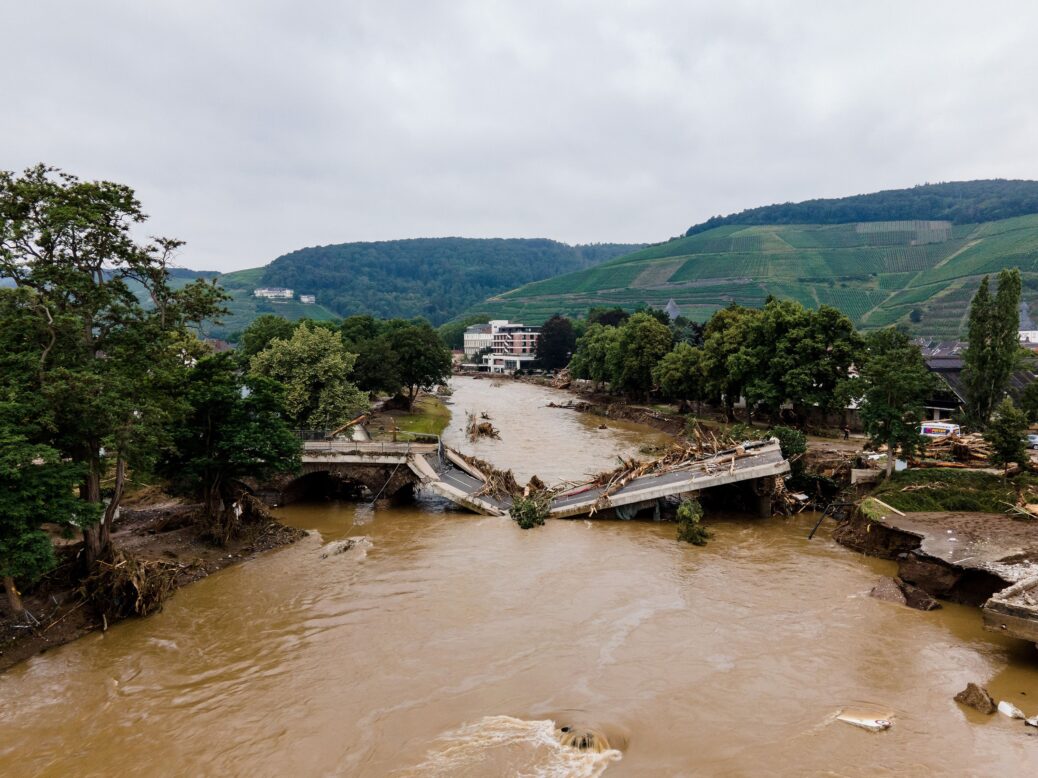
A thunderbolt. A flash of lightning through the horizon. The smell of rain nearby. So far, so normal for a summer storm. Or so I thought on Monday evening (12 July) in south-east London – before opening Twitter to see torrents of floodwater cascading down into Chelsea’s Sloane Square Underground station, Hampstead’s coffee shops submerged, and furniture floating in a Portobello Road bar. A whole month’s rain in one day. Three inches in 90 minutes.
Days later, an infinitely worse deluge hit western Europe. At time of writing, at least 120 people are dead and hundreds more still missing after record-breaking flash floods. The majority were killed in Germany, where whole houses were washed away by an overflowing Rhine. Some drowned in basement cellars, others in attempting to rescue the stranded. The scenes are terrible and shocking – even in the context of this summer’s extreme heatwave and wildfire events in the US, and even to the climate scientists who have long warned of where the general trend is heading.
“In these hours, peaceful places are experiencing a catastrophe,” German chancellor Angela Merkel said on Thursday from Washington, DC. “Heavy rainfall and floods are very inadequate words to describe this.”
The German premier was in the US to discuss, among other things, how tackling the climate crisis provides common ground between the two democracies. A resulting statement from President Joe Biden was a reminder that both leaders are aiming to limit the temperature rises that are making these once-in-a-century disasters increasingly routine. The two countries would also “unite our efforts” to further raise global climate ambitions, the president added.
[See also: As water scarcity intensifies, so does the battle for resources]
Both Europe and the US can this week point to actions that shows these are not just empty words.
On Wednesday, as Philippa Nuttall-Jones writes, the European Commission presented a package laying out plans for how to more than halve EU emissions by 2030. This includes a proposed fund to support those who might struggle with higher fuel bills as a result of reforms.
In Washington, meanwhile, Senate Democratic leaders announced they’d reached agreement on a $3.5trn budget deal – which should feature greater spending on climate, healthcare and more.
And yet, the fear of emptiness haunts these promises.
First, there is the knowledge that while pledges and plans are one thing, implementation is quite another. An impressively strong German commitment to reducing emissions by 65 per cent by 2030 has been undermined by a sluggish deadline for phasing out coal. Furthermore, both France and Germany have already opposed the EU proposal to phase out petrol cars by 2035. Meanwhile, President Biden’s bipartisan infrastructure bill – for an additional $600bn – has also cut many of its climate provisions.
On top of this is the realisation that these recent natural catastrophes are only the start. “This is not ‘the new normal’” tweeted Greta Thunberg in response to Germany’s plight; the world is only at “the very beginning” of the emergency to come.
I hate to write this, as spreading fear of change carries the very real risk of encouraging some to further bury their heads in the sand (or worse, attempt to stop those who want to act). But the world knows the big crisis is still ahead. It could be a mega-fire in California, a heatwave in Gujarat, a hurricane in the Caribbean. It will likely be all these things and more.
Each opportunity, therefore, both to mitigate and to prepare, must be seized as firmly as possible, with doubting minds reassured with a calm but clear presentation of the facts, and vague and modest proposals replaced with swift and concrete action. The loss already unfolding in our storm-torn, fire-strewn, “peaceful” streets demands nothing less.
[See also: How the Amazon rainforest emits more carbon now than it absorbs]






